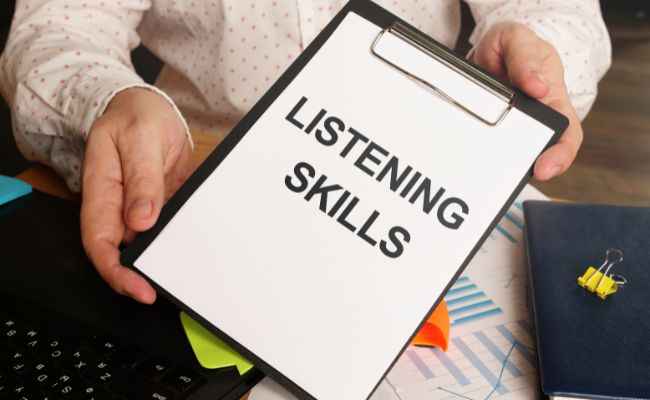


Listening is a complex and selective process of receiving, focussing, accepting, and storing. It is an activity of great importance as it demands high-level class seriousness. Listening is the ability to receive and interpret messages in the communication process.
Listening is a key to all effective communication. Without this ability, messages are easily misunderstood. It shows a person’s attitude towards other people. Kevin Murphy said, The better you listen, the luckier you will get.
If you want to be a good listener, you must follow the four distinct components of listening Hear, comprehend, Retain, and Recall. Let’s see the difference between Hearing and Listening.
Hearing is a part of listening. Hearing is merely the ability of the ear to realize sounds but listening is more of a conscious effort to understand the sounds, requiring concentration of mind. It is a mental activity that involves important four distinct components listening to Hear, Comprehend, Retain, and Recall.
Effective listening is actively absorbing the information, and providing feedback to the speaker so that he or she knows the message was received. Effective listeners show speakers that their message is received and understood.
In order to listen effectively, one must focus and make an effort. Effective listening is listening with the intent to understand rather than just hearing what was said. The ability to listen well is a skill. As a result, being better and more proficient at it demands practice.
There are six stages of listening
Sound waves make their way to your ears: you hear something. This could be the barking of a dog, a car’s alarm system or someone’s words.
You give attention to the sounds you want to hear. For instance, you may ignore the barking dog at the distance and you screen it out entirely. The other story may be the story of the sound of the car alarm. If you hear the sound of your car, you pay attention to it! Paying attention becomes difficult when there is noise that makes it harder to hear the sounds.
In stage 3, we try to make sense of the sound that we are now paying attention to. For example, in the case of the car alarm, we understand that someone is trying to steal our car!
In the case of a conversation, we will try to understand what the other person is telling us. Problems might occur if the other person speaks a different language or is using terminology that is not known to you.
Here, we have an opinion about what we have heard. We pay attention to it and understand it. We decide to remember and get positive, neutral, or negative about it. Often we judge too quickly, e.g. When we have strong beliefs about a topic or if we do not like the person we are listening to.
At this stage, we may react to what we have heard and pay attention to it. In the example of a car alarm, we respond by running out to our car. In a conversation, we could either respond verbally ( with words) or non-verbally ( body language, facial expression).
We can check whether we understood the speaker by asking questions or we could give feedback on what we have heard. If you do not respond properly, your communication usually stops.
The last stage is the remembering stage. This stage happens within the communication. You need to remember what has been said to react and keep the talk going. Most of the time, we will not be able to remember 75% of the details of a conversation in the future unless we jot down some notes afterward.
Listening may be of the following types:
The listener pretends that through his facial expressions, the message is listened to.
It means selecting the desired part and ignoring the undesired part of the message. The listener wants to hear only what he/s wants to hear.
In this listening, we intently and intensively understand the person fully both emotionally and intellectually. It shows the caring attitude of the listener. This type of listening occurs amongst close friends or relatives.
It means you pay attention to the words of the speaker. It involves eye contact with the speaker. You allow the speaker to complete thorough thoughts.
It is a kind of listening in which the communicators stimulate each other’s response.
It means listening through an intuitive mind by silencing the other dialogues going on at the same time.
Effective Listening is vital for overall efficiency in all our job duties and the roles we play in our personal lives such as partners, parents, kids, or friends. You play different roles in your life. Let’s have a look at it.
Listening skill is as important as the other skills, i.e., speaking, reading, and writing. Good listening skills can be hampered because of some elements.
We create hindrances to listening through our own prejudice against the speaker. We lose concentration on what the speaker is saying. We always focus on who is talking. In order to develop good listening skills we must only pay attention to the words.
External distraction also plays an important role in misunderstanding the real words of the speaker. There are so many external distractions such as noisy fans, poor lights, music from outside, etc.
Normally 80-160 words are spoken in a minute. Usually, people have the capacity to think at the rate of 800 words per minute. This is the main reason that pre-thinking is the major element among the faults of listening. The listeners should not jump to the conclusion as it mars the beauty of good listening.
The semantic barrier is created because of the negative meanings that a listener willingly attaches to the words of the speaker. This can be avoided if we analyze the speech impartially and patiently.
If the speech is delivered in a good style it will help the listeners in understanding not only the gist but also the contents of it. Otherwise, a badly delivered speech will make a mess of the meanings.
Too much information being presented at once can overwhelm the listener, making it challenging to process and retain the key points.
Ineffective communication by the speaker, including unclear or disorganized speech, can impede understanding and active listening.
When listeners prematurely judge or criticize the speaker’s ideas or delivery, it can hinder open and constructive dialogue.
Assuming that one already knows what the speaker will say can lead to selective listening and missing important information.
The presence of smartphones or other electronic devices can divert attention away from a speaker.
Here are some tips to improve listening skills.
Finally, basic listening skills are fundamental abilities that enable effective communication. These skills include being present, maintaining focus, showing empathy, asking questions, and providing feedback. Developing these skills is essential for building strong relationships, understanding others, and improving overall communication proficiency.
One thought on “Basic Listening Skills Types, Barriers, and Tips to Improve”